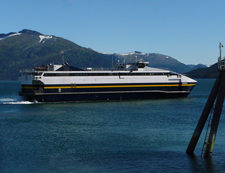
The Alaska Marine Highway System says the engines being used in their two fast ferries are defective and builders of the ships knew it when they delivered the ships only six years ago. But the ferries’ builders say it’s not their fault, and they shouldn’t be obligated to replace the engines when the warranty doesn’t cover it.
Judge Philip Pallenberg enters the courtroom lugging a stack of files and documents easily a foot high. He’s about to get handed a few more accordian folders that will extend that by several more inches.
“I think the state fired the opening salvo in this naval battle,” said Pallenberg. “So, I think the state should go first.”
October 7th’s skirmish in Juneau Superior Court was over the engines installed in the state’s fast ferries Fairweather and Chenega, relatively new ships with diesel-powered jet drives that push the catamarans at a nice 32-knot clip. That’s about twice the speed of the ferry system’s standard mono hulls.
State attorney Dana Burke is leading the attack for the ferry system. But he runs out of time during oral arguments to carefully cite excerpts of contract documents and internal memos. Burke says manufacturers of the fast ferries knew the engines were defective, almost as soon as they were installed. He said they breached warranties that called for repairs and – if necessary – replacement of the engines. For both ships, all eight engines have been valued at $20 million.
“And we cannot wait,” said Burke. He said both the Fairweather and Chenega are in danger of being decertified from passenger service in the very near future.
Burke wants the ship and engine builders’ liability extended to the engines’ defects, especially when they admitted to using the wrong kind of coolant (that accelerated corrosion in the engines).
Burke said that MTU instructed the state to stop using Power Cool 3000 because it might degrade a layer of molybdenum in the crank case cylinder bores.
David McMahon representing Robert Derecktor Incorporated said the state was not entitled to any more rights after expiration of a standard year-and-a-half warranty.
“These two vessels have been operated on an uninterrupted basis since they went into operation,” said Burke.
But Derecktor Shipyard is only one of the parties in the state’s lawsuit. The state’s real target is MTU Friedrichshafen and MTU Detroit Diesel, the German company that built the engines and the American company that did the subsequent repairs.
Jon Dawson, who has already been prepared for a response, said they already have a potential repair of an interstitial ring that they’ve been trying to install.
“Scare mongering and hyperbole aside, the principle issue in this case involves only one component of these engines: the engine block,” said Dawson.
Dawson said there are clear factual issues at what caused the faster-than-expected deteroriation; instead of the coolant – perhaps the Alaska environment, improper maintanence by ferry crews, even excessive vibration caused by a misaligned installation by the shipyard.
“You can’t wave a wand and resolve this wear issue when you don’t know what’s causing it,” said Dawson.
Dawson also says the engine warranty was assigned to Derecktor – the general contractor, not the final buyer of the vessels, or in this case, the state ferry system. And it did not include replacement of the entire engine, beyond the engine block.
But the plantiffs always have the last word in any courtroom argument.
“Something’s wrong with these engines. They’re lemons,” said Burke. “These were defective beyond delivery and someone is responsible.”
October 7th’s hour-and-twenty minute oral arguments focused not on any factual disputes, but primarily arcane and esoteric interpretations of liability and warranty law. It will be sometime before Judge Philip Pallenberg issues an opinion.
